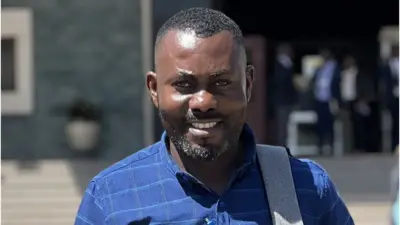We've updated our Privacy and Cookies Policy
We've made some important changes to our Privacy and Cookies Policy and we want you to know what this means for you and your data.
Nottingham attacks: Families call for law change after CPS review
- By Alex Smith & Greig Watson
- BBC News, Nottingham
The families of three people killed in the Nottingham attacks have called for homicide laws to be changed following a review into the case.
Barnaby Webber and Grace O'Malley-Kumar, both 19, and Ian Coates, 65, were stabbed to death on 13 June.
Valdo Calocane was given a hospital order in January for manslaughter on the basis of diminished responsibility.
Mr Webber's mother Emma said until the law changed, "murderers will get away with murder".
The HM Crown Prosecution Service Inspectorate (HMCPSI) looked into how the Crown Prosecution Service (CPS) handled the case following complaints by the victims' families.
The complaints included the families saying they were not provided with "sufficient information at an early enough stage" regarding the direction of the case.
According to the HMCPSI, the families said police led them to believe the attacks were "a clear case of murder".
"The decision to accept pleas was, understandably, always going to be unpalatable for grieving families who have suffered the most unbearable loss in such traumatic circumstances, irrespective of the stage of proceedings that decision was made and communicated," the report added.
Inspectors concluded prosecutors were right to accept manslaughter pleas, but could have handled the case better.
The report also called on the government to consider changing the categorisation of homicide into three tiers - first degree murder, second degree murder and manslaughter - as recommended by the Law Commission nearly 20 years ago.
It is currently categorised into two tiers - namely murder and manslaughter.
The victims' families said they were "disappointed but not entirely surprised" with the report's findings, and agreed the law needed revising.
Mrs Webber said: "Until the law changes in this country, the diminished responsibility charge and plea means murderers will get away with murder."
She added: "We have never disputed Calocane's mental health problem, but what I would say at the moment in this country if you commit murder and you have mental health issues, then it is very unlikely you are going to be tried for murder.
"And it is abhorrent it could be downgraded to manslaughter, just because it is how the law is stated."
Mr Coates's son James said the families "can't breathe until everything is done and dusted".
Asked about his grievances with the charges, he said there was "no opportunity to disagree and push back, we felt we were told what was going to happen and we weren't given an option".
Dr Sanjoy Kumar, father of Ms O'Malley-Kumar, said: "I think the first question you have to ask is - can a paranoid schizophrenic commit murder in this country?
"Because it seems to me that you can't, and that's impossible for us to understand."
The HMCPSI review was prompted by a meeting between the victims' families and Prime Minister Rishi Sunak.
The report noted the families felt "unsupported and secondary to the whole process", with the watchdog suggesting that greater clarity is needed about the role of victims in the criminal justice system.
It said two of the families were invited to a meeting with the CPS and prosecution counsel on 24 November, 7 December and 15 January.
But the report said there was no record of a "third family" - the Coates family - being specifically told about these meetings, which led to a feeling of being "left out and overlooked".
Had the Coates family been told about the meetings, the review said, they could have made a fully informed choice as to whether to attend or not.
The report said: "The CPS must ensure that, in cases where there are multiple victims/bereaved families, the same level of service is provided to all."
Image source, Nottinghamshire Police
It recommended the CPS undertake a review of all guidance relating to victims' engagement to ensure its use of the terms "consult" or "consultation" are appropriate.
"There is no obligation on the CPS to 'consult' victims when making a decision on the evidential test of the Code for Crown Prosecutors, but rather to 'inform' and 'explain' their decision," the report added.
Following the review, the CPS's director of public prosecutions Stephen Parkinson said: "In tragic and complex circumstances such as these, the CPS has difficult decisions to make, but must always act with independence and professionalism.
"I believe that our team did so in this case, and with considerable dedication and commitment.
"I am grateful to the Inspectorate for the care and thoroughness with which they have reviewed our actions. We will carefully consider the report's findings."
Image source, PA Media
Mr Webber and Ms O'Malley-Kumar were stabbed to death in Ilkeston Road, before Mr Coates was found dead with knife injuries in Magdala Road after his van was stolen.
The stolen van was then used by Calocane to drive into pedestrians Wayne Birkett, Marcin Gawronski and Sharon Miller in the city centre, with all three left with serious injuries.
Calocane, 32, who a court heard was suffering from paranoid schizophrenia at the time of the killings, admitted manslaughter and three counts of attempted murder on 28 November.
On 23 January, the CPS announced it had accepted the pleas, on the basis of diminished responsibility, with Calocane sentenced two days later.
The Big Cases: The Nottingham Attacks
The story of Barnaby Webber, Grace O'Malley-Kumar and Ian Coates, who were killed in a series of stabbings by one man on the streets of Nottingham in the summer of 2023.
At the time, the CPS said medical experts provided "overwhelming" evidence Calocane was suffering from a serious mental health condition, including hearing voices in his head telling him his family would be harmed unless he did what they told him to do.
Three psychiatrists were asked to analyse Calocane's condition and all agreed it "impaired his ability to exercise self-control".
The CPS "took the unusual step" of asking a fourth expert to review those reports, and after they agreed with the findings, prosecutors concluded there was "no realistic prospect of conviction for murder".
Following the sentencing, Mr Webber's mother said the CPS had, in November, presented her family with "a fait accompli that the decision had been made to accept manslaughter charges".
"At no point during the previous five and a half months were we given any indication that this could conclude in anything other than murder," she said.
How central should victims be in the justice system?
Since 2002, when the Labour government said it intended to "place the victim at the heart of the criminal process", far greater emphasis has been put on ensuring victims are supported, informed and respected.
But, historically, the law in England and Wales does not allow individual victims to influence the actions of the courts.
Prosecutions are conducted on behalf of the Crown, not the victim, with a focus on objective testing of evidence, rather than emotion.
The inspectorate said today that "the narrative of putting victims at the heart of the criminal justice system is leading to false expectations".
It recommends the CPS reviews its guidance on engaging with victims and notes the Victims and Prisoners Bill going through Parliament might offer an opportunity for greater clarity.
In addition to the CPS, the NHS and two police forces are being reviewed, with the victims' families also calling for a public inquiry into the case.
The prime minister has stopped short of committing to an inquiry, but promised that "we will get the answers".
Nottinghamshire Police has already admitted it "should have done more" to arrest Calocane before the killings, after confirming a warrant for his arrest had been issued about a year after he allegedly assaulted a police officer in 2021.
The force is being investigated by the IOPC, which is also looking into Leicestershire Police, after it emerged the force was looking into a report Calocane had assaulted two colleagues just weeks before the killings.
Nottinghamshire Police has also referred itself to the IOPC over its handling of disciplinary procedures, after it emerged a special constable had viewed bodycam footage showing the aftermath of the attacks.
NHS England has ordered a major investigation into Calocane's contact with mental health services, and his care under the Nottinghamshire Healthcare Foundation NHS Trust is being reviewed by the Care Quality Commission.
Meanwhile, Calocane's sentence will be reviewed after the attorney general said it was unduly lenient.
The families previously said they were due to meet the IOPC on Tuesday.
Follow BBC East Midlands on Facebook, on X, or on Instagram. Send your story ideas to eastmidsnews@bbc.co.uk or via WhatsApp on 0808 100 2210.
Top Stories
Features & Analysis
Most read
Content is not available








